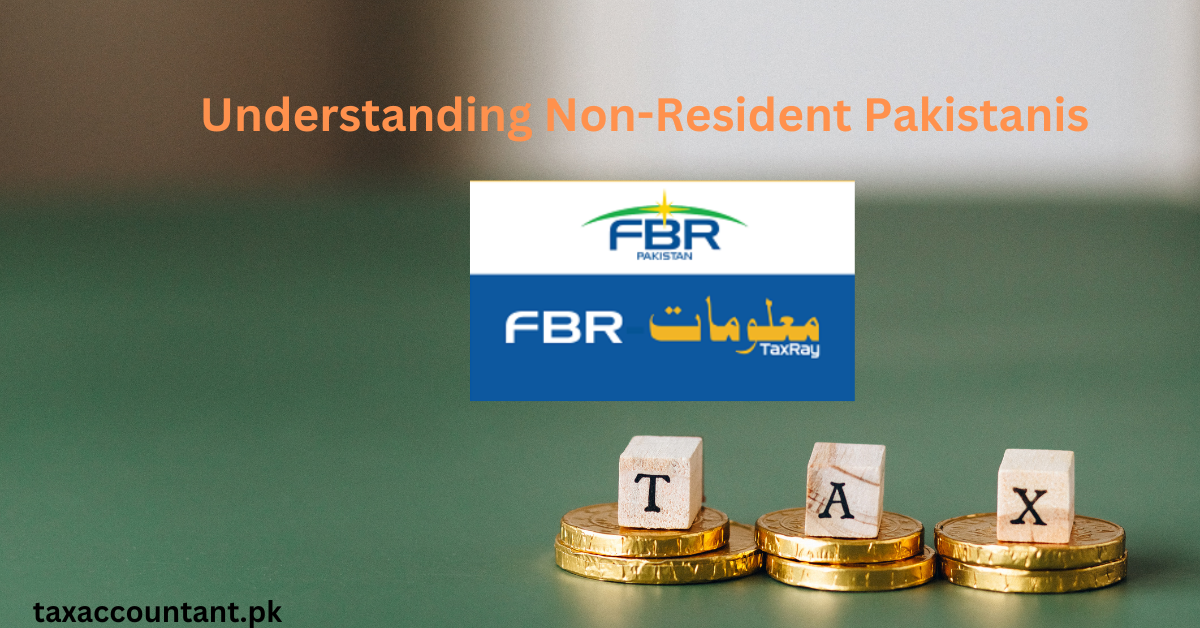Non-resident Pakistanis play a significant role in the country’s economy and culture, contributing through remittances, investments, and cultural exchanges.
In this blog article guide, we will explore about the intricacies of being a non-resident Pakistani, covering taxation, lifestyle, community engagement, and more.
What Defines a Non-Resident Pakistani?
A non-resident Pakistani is typically someone who holds Pakistani citizenship but resides outside Pakistan for a significant portion of the year. According to the tax laws, an individual is considered a non-resident if they have lived outside of Pakistan for 120 days or more in a single tax year or cumulatively for 365 days over the past four years. This classification has profound implications on taxation and legal obligations within Pakistan.
Tax Residency Status
The determination of tax residency is crucial as it affects tax liabilities:
- Resident Individuals: Those who spend 183 days or more in Pakistan during a tax year are classified as residents and are taxed on their worldwide income.
- Non-Resident Individuals: Non-residents are only taxed on their Pakistan-source income, which includes income generated from businesses or properties located within the country.
Taxation of Non-Resident Pakistanis
Understanding the tax obligations of non-resident Pakistanis is essential for compliance and financial planning.
Filing Requirements
Non-resident Pakistanis are not mandated to file a tax return unless they have income sourced from Pakistan. However, filing can provide several benefits:
- Tax Filer Status: By voluntarily filing a return, non-residents can attain tax filer status, which offers various advantages such as lower withholding taxes on property transactions and banking activities.
- Documentation Needed: To file taxes, non-residents should maintain records of any income earned in Pakistan, investment documents, and previous tax returns if applicable.
Tax Treaties and Foreign Income
Pakistan has entered into tax treaties with over 66 countries to avoid double taxation. These treaties allow non-residents to claim relief on foreign-source income that may be taxable both in their country of residence and in Pakistan.
- Foreign Tax Credits: Non-residents can claim credits for taxes paid abroad against their Pakistani tax liabilities, ensuring they are not taxed twice on the same income.
Benefits of Being a Non-Resident Tax Filer
Filing taxes as a non-resident can unlock numerous benefits:
- Investment Opportunities: Non-residents looking to invest in real estate or the stock market can enjoy reduced tax rates and fewer regulatory hurdles if they are registered as tax filers.
- Legal Compliance: Filing ensures compliance with Pakistani laws, reducing the risk of penalties or legal issues that could arise from unreported income.
- Access to Financial Services: Tax filers may find it easier to access banking services and loans within Pakistan due to their compliant status.
Community and Lifestyle for Non-Residents
Living outside Pakistan does not mean disconnecting from one’s roots. Non-resident Pakistanis often engage with their homeland through various means:
Cultural Engagement
Non-resident Pakistanis maintain strong ties to their culture through:
- Community Events: Many cities around the world have vibrant Pakistani communities that organize events celebrating cultural festivals like Eid or Independence Day.
- Culinary Traditions: Cooking traditional dishes at home helps keep cultural practices alive among families living abroad.
Networking Opportunities
Non-residents can leverage platforms such as InterNations or local Pakistani associations to connect with fellow expatriates:
- Support Networks: These networks provide valuable resources for navigating life abroad, including job opportunities and social gatherings.
- Professional Development: Engaging with other professionals from Pakistan can lead to collaborations that benefit both personal growth and business ventures.
Challenges Faced by Non-Resident Pakistanis
While being a non-resident has its advantages, it also comes with challenges:
Navigating Tax Laws
Understanding complex tax regulations can be daunting. Non-residents often face difficulties such as:
- Time Zone Differences: Coordinating with local authorities like the Federal Board of Revenue (FBR) can be challenging due to time zone disparities.
- Language Barriers: Navigating official documents and online portals may pose difficulties for those not fluent in Urdu or English.
Safety Concerns
Although many non-residents maintain close ties with their homeland, safety concerns in certain regions may deter them from frequent visits. It’s essential for non-residents to stay informed about the security situation in Pakistan while planning any travel back home.
Being a non-resident Pakistani involves navigating various aspects ranging from taxation to cultural identity. By understanding their rights and responsibilities, non-residents can effectively manage their affairs while maintaining strong connections to their homeland. With proactive engagement in community networks and adherence to legal requirements, non-resident Pakistanis can thrive both abroad and within their home country.
What are the key tax implications for non-resident Pakistanis?
Non-resident Pakistanis (NRPs) play a vital role in the economy of Pakistan, particularly through remittances and investments. However, understanding the tax implications associated with their status is crucial for compliance and financial planning. Below we will outlines the key tax obligations, benefits, and considerations for NRPs under Pakistani tax law.
Definition of Non-Resident Pakistani
A non-resident Pakistani is defined as an individual who holds Pakistani citizenship but resides outside the country for a significant portion of the year. Specifically, a person is considered non-resident if they spend:
- More than 120 days in a foreign country during a single tax year.
- Cumulatively more than 365 days outside Pakistan over the past four years.
This classification affects their tax obligations significantly.
Tax Obligations for Non-Resident Pakistanis
1. Tax on Pakistan-Source Income Only
Non-resident Pakistanis are only required to declare and pay taxes on their income sourced from Pakistan. This includes:
- Rental income from properties located in Pakistan.
- Dividends from Pakistani companies.
- Capital gains from the sale of assets situated in Pakistan.
- Any business income generated through activities conducted within Pakistan.
They are not liable to pay taxes on income earned outside of Pakistan, which is a major benefit of their non-resident status.
2. Filing Requirements
While non-residents are not mandated to file a tax return unless they have taxable income from Pakistan, it is often advisable to do so:
- Simplified Filing: Non-residents can file a simplified tax return specifically designed for them, which only requires reporting Pakistan-source income.
- Benefits of Filing: By filing a return, NRPs can obtain tax filer status, which may provide advantages such as reduced withholding taxes on property transactions and easier access to banking services in Pakistan.
3. Tax Rates for Non-Residents
The tax rates applicable to non-residents vary depending on the type of income:
| Type of Income | Tax Rate |
|---|---|
| Royalties and fees for technical services | 15% |
| Payments for construction contracts | 6% |
| General income (other than specified types) | 30% |
These rates apply unless there is a specific tax treaty that provides for lower rates or exemptions.
Tax Treaties and Foreign Income
Pakistan has entered into tax treaties with over 66 countries aimed at avoiding double taxation. These treaties can significantly affect how non-residents are taxed on their income:
- Relief from Double Taxation: If NRPs earn income that is taxable in both their country of residence and Pakistan, they may be eligible for relief under these treaties. This typically involves claiming a credit for taxes paid abroad against their Pakistani tax liabilities.
- Exemptions Under Treaties: Certain types of income may be exempt from taxation in Pakistan if covered by these treaties. For example, specific payments made under bilateral agreements may not attract withholding taxes.
Benefits of Being a Tax Filer
Filing as a non-resident taxpayer can provide several advantages:
- Lower Withholding Taxes: NRPs who file can benefit from reduced withholding taxes on various transactions, including property purchases and financial investments.
- Avoiding Audits: By declaring themselves as tax filers, NRPs can mitigate the risk of audits by the Federal Board of Revenue (FBR) concerning their foreign-source income.
- Access to Financial Services: Being registered as a taxpayer can facilitate easier access to banking services, loans, and investment opportunities within Pakistan.
Challenges Faced by Non-Resident Pakistanis
Despite the benefits, NRPs may encounter several challenges:
1. Complexity of Tax Laws
Understanding the nuances of Pakistani tax law can be complicated, especially regarding what constitutes taxable income and how treaties apply. Many NRPs may find it challenging to navigate these regulations without professional assistance.
2. Time Zone Differences
Coordinating with local authorities like the FBR can be difficult due to time zone differences, potentially leading to delays in communication or compliance issues.
3. Language Barriers
Official documents and online portals are primarily in Urdu or English, which may pose difficulties for some NRPs who are not fluent in these languages.
Non-resident Pakistanis have unique tax implications that differ significantly from those of resident taxpayers. By understanding their obligations concerning Pakistan-source income, filing requirements, and potential benefits from tax treaties, NRPs can effectively manage their financial affairs while remaining compliant with Pakistani laws. It is advisable for NRPs to seek professional guidance to navigate these complexities and ensure they maximize their benefits while minimizing legal risks.
What types of income are taxable for non-resident Pakistanis?
Non-resident Pakistanis (NRPs) are subject to specific tax obligations regarding their income sourced from Pakistan. Understanding what types of income are taxable is crucial for compliance and effective financial planning. Here’s a detailed overview of the types of income that are taxable for non-resident Pakistanis.
Taxable Income for Non-Resident Pakistanis
According to the Income Tax Ordinance, 2001, non-resident Pakistanis are required to pay taxes only on their Pakistan-source income. The following categories outline the types of income that NRPs must consider:
1. Salary Income
- Employment in Pakistan: If a non-resident earns salary income from employment exercised in Pakistan, it is considered taxable. This includes salaries paid by the federal government, provincial governments, or local authorities.
- Remuneration from Pakistani Entities: Any remuneration derived from services rendered to a resident person or a permanent establishment in Pakistan is also taxable.
2. Property Income
- Rental Income: Any income generated from renting out properties located in Pakistan is subject to tax. This includes residential and commercial properties.
- Tax Calculation: Rental income is taxed on a net income basis after allowable deductions for expenses related to property management.
3. Business Income
- Pakistan-Source Business Activities: Non-residents engaged in business activities that generate income attributable to a permanent establishment (PE) in Pakistan must pay taxes on that income. This includes:
- Sales of goods or merchandise through a PE.
- Services provided through a PE.
- Any business connection within Pakistan that generates revenue.
- Independent Services: If a non-resident provides independent services (e.g., consultancy, entertainment), any remuneration paid by a resident or borne by a PE in Pakistan is treated as business income and is taxable.
4. Capital Gains
- Sale of Assets: Capital gains arising from the sale of capital assets located in Pakistan, such as real estate or shares of Pakistani companies, are taxable. The applicable tax rates depend on the nature of the asset and holding period.
- Tax Treatment: Gains from the disposal of immovable properties are taxed at specified rates, while gains from shares may be subject to different treatments depending on the stock exchange regulations.
5. Income from Other Sources
This category encompasses various types of income, including:
- Dividends: Dividends received from Pakistani companies are subject to withholding tax at a rate of 15%.
- Royalties and Fees for Technical Services: Payments made as royalties or fees for technical services attract a final withholding tax rate of 15%.
- Interest Income: Interest earned on deposits with banks or financial institutions in Pakistan is taxed at a rate of 15% if total interest exceeds PKR 5 million; otherwise, it is subject to normal slab rates.
Summary of Tax Rates for Non-Resident Income
| Type of Income | Tax Rate |
|---|---|
| Salary (from Pakistani employment) | Taxable |
| Rental Income | Taxable |
| Business Income | Taxable |
| Capital Gains | Varies by asset type |
| Dividends | 15% |
| Royalties and Technical Fees | 15% |
| Interest Income | 15% (or slab rates if exceeding PKR 5 million) |
Non-resident Pakistanis must navigate specific tax obligations related to their Pakistan-source income. By understanding the types of taxable income—ranging from salary and property income to capital gains and dividends—NRPs can ensure compliance with Pakistani tax laws while optimizing their financial strategies. It is advisable for NRPs to consult with tax professionals familiar with both local and international tax regulations to effectively manage their tax liabilities.





